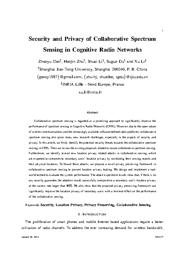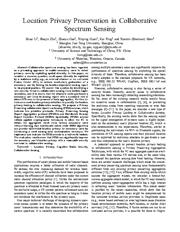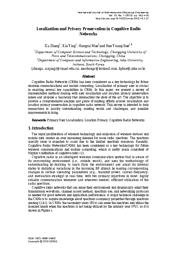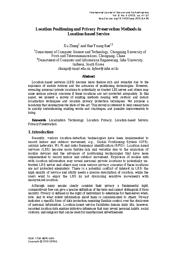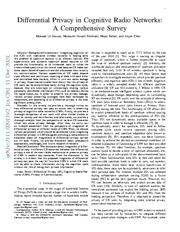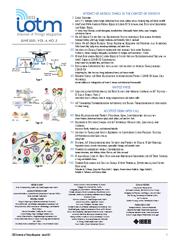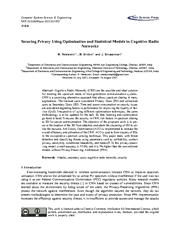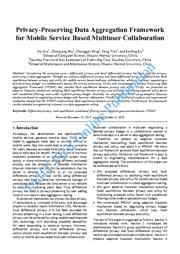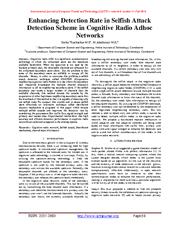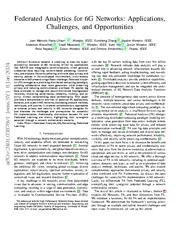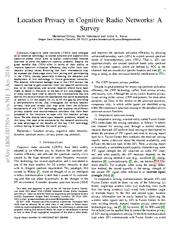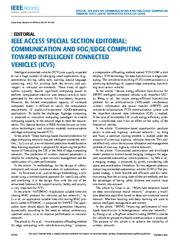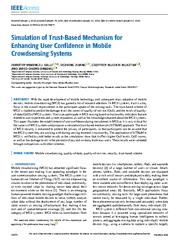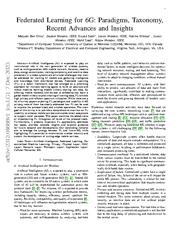A copy of this work was available on the public web and has been preserved in the Wayback Machine. The capture dates from 2016; you can also visit the original URL.
The file type is application/pdf.
Filters
Security and privacy of collaborative spectrum sensing in cognitive radio networks
2012
IEEE wireless communications
To thwart these attacks, we propose a novel privacy preserving framework in collaborative spectrum sensing to prevent location privacy leaking. ...
In this article, we firstly identify the potential security threats towards the collaborative spectrum sensing in CRNs. ...
To thwart these attacks and preserve location privacy, we propose a novel privacy preserving framework for collaborative spectrum sensing. ...
doi:10.1109/mwc.2012.6393525
fatcat:p26havo5sjcklmbnxpc3rhylei
Location privacy preservation in collaborative spectrum sensing
2012
2012 Proceedings IEEE INFOCOM
We propose a Privacy Preserving collaborative Spectrum Sensing (PPSS) scheme, which includes two primitive protocols: Privacy Preserving Sensing Report Aggregation protocol (PPSRA) and Distributed Dummy ...
can provide differential location privacy for secondary users by introducing a novel sensing data randomization technique. ...
Based on the proposed privacy model, we introduce a novel Privacy Preserving collaborative Spectrum Sensing (PPSS) scheme to achieve sensing report aggregation without location privacy leaking. ...
doi:10.1109/infcom.2012.6195818
dblp:conf/infocom/LiZGGXS12
fatcat:g7l6g2cl2jguxl7xk6qcbqowda
Localization and Privacy Preservation in Cognitive Radio Networks
2014
2014 8th International Conference on Future Generation Communication and Networking
The objective is to provide a comprehensive analysis and guide of existing efforts around localization and location privacy preservation in cognitive radio network. ...
In this paper, we present a survey of representative methods dealing with user localization and location privacy preservation issues and propose a taxonomy that summarizes the state-of-the-art. ...
It has been adopted in many privacy preservation applications such as data mining [26] , collaborative sensing [27] and collaborative spectrum sensing [28] . ...
doi:10.1109/fgcn.2014.19
fatcat:jmwm7gts45g3zjvhhleqxvt2gq
Location Positioning and Privacy Preservation Methods in Location-based Service
2015
International Journal of Security and Its Applications
In this paper, we present a survey of existing methods dealing with outdoor and indoor localization techniques and location privacy protection techniques. ...
However, revealing personal private locations to potentially un-trusted LBS server and others may raise serious privacy concerns if these locations are not protected adequately. ...
Acknowledgement This work was financially supported by the Natural Science Foundation of China This paper is a revised and expanded version of a paper entitled "Privacy-preserving Localization in Cognitive ...
doi:10.14257/ijsia.2015.9.4.06
fatcat:gvfsplrbcfhvzm345zb4im2dbm
LPOS: Location Privacy for Optimal Sensing in Cognitive Radio Networks
[article]
2018
arXiv
pre-print
In this paper, we develop a new Location Privacy for Optimal Sensing (LPOS) scheme that preserves the location privacy of SUs while achieving optimal sensing performance through voting-based sensing. ...
One effective technique through which unlicensed users, often referred to as Secondary Users (SUs), acquire whether a channel is vacant is cooperative spectrum sensing. ...
To cope with these attacks, the authors propose PPSS, a Privacy Preserving collaborative Spectrum Sensing protocol, that uses secret sharing and the Privacy Preserving Aggregation (PPA) process to hide ...
arXiv:1806.03572v1
fatcat:77sh4u7gtrcwjomqwp7od55qgq
Differential Privacy in Cognitive Radio Networks: A Comprehensive Survey
[article]
2021
arXiv
pre-print
In order to preserve this privacy leakage, various privacy preserving strategies have been developed by researchers, and according to us differential privacy is the most significant among them. ...
The opportunistic and dynamic spectrum access features of CR provide the functionality to its unlicensed users to utilize the underutilized spectrum at the time of need because CR nodes can sense vacant ...
Li worked over preserving location privacy during collaborative spectrum sensing of CRN via differential privacy. 2014 • [12] W. ...
arXiv:2111.02011v2
fatcat:a5hique4fvfxrclslvpgda5jyy
Table of Contents
2021
IEEE Internet of Things Magazine
Kishor Narang ACCEPTED FROM OPEN CALL DATA AGGREGATION AND PRIVACY PRESERVING USING COMPUTATIONAL INTELLIGENCE Umair Khadam, Muhammad Munwar Iqbal, Sohail Jabbar, and Syed Aziz Shah DISTRIBUTED SPECTRUM ...
COLLABORATIVE MOBILE CROWDSOURCING
Li Yang and Abdallah Shami
TOWARD BLOCKCHAIN FOR EDGE-OF-THINGS: A NEW PARADIGM, OPPORTUNITIES, AND FUTURE
DIRECTIONS
10
20
16
26
34
40
46
4
Sensing ...
doi:10.1109/miot.2021.9492941
fatcat:co2ozw7a5ngufkl6p3ncorrhu4
Securing Privacy Using Optimization and Statistical Models in Cognitive Radio Networks
2022
Computer systems science and engineering
ACO is used to form clusters of SUs in the co-operative spectrum sensing technique. ...
In this privacy-preserving model, overall accuracy is 97.4%, and it is 9% higher than the conventional models without Privacy-Preserving Architecture (PPA). ...
Experimentations are done for the same attacks for the proposed privacy-preserving and non-privacy-preserving models. ...
doi:10.32604/csse.2022.021433
fatcat:oq7vk47fmjhe7agxn7pqh4uk34
Privacy-Preserving Data Aggregation Framework for Mobile Service Based Multiuser Collaboration
2019
˜The œinternational Arab journal of information technology
negotiating a desired privacy budget in a collaborative manner for privacy-preserving. ...
Considering the untrusted server, differential privacy and local differential privacy has been used for privacy-preserving in data aggregation. ...
Differential privacy also had applied to collaborative search log [10] and crowdsourced spectrum sensing [11] to prevent an untrusted third party from learning user's privacy information. ...
doi:10.34028/iajit/17/4/3
fatcat:sdwl7gy2fvetxgogy7szmaet3y
Enhancing Detection Rate in Selfish Attack Detection Scheme in Cognitive Radio Adhoc Networks
English
2014
International Journal of Computer Trends and Technology
English
When the spectrum is not used by the licensed primary user, the obtainable channels are allocated for the unlicensed secondary users (SUs). ...
To avoid these types of attacks, a new privacy preserving framework is proposed in collaborative spectrum sensing to prevent location privacy leaking. ...
Haojin Zhu et.al proposed a method to find the probable security threats towards the collaborative spectrum sensing in cognitive radio networks [2] and to locate several privacy ISSN: 2231-2803 http: ...
doi:10.14445/22312803/ijctt-v8p129
fatcat:fgntp7tuizgknp7zg3fudxcwli
Federated Analytics for 6G Networks: Applications, Challenges, and Opportunities
[article]
2024
arXiv
pre-print
Federated Analytics (FA) emerges as a promising distributed computing paradigm, enabling collaborative data value generation while preserving privacy and reducing communication overhead. ...
It explores complementary approaches to enhance privacy and security in 6G networks alongside FA and discusses the challenges and prerequisites for successful FA implementation. ...
For multidomains, FA enables collaborative data analysis and insights generation while preserving data privacy. ...
arXiv:2401.03878v1
fatcat:a64p6bydmje6zlswiuyncgxjfq
Location Privacy in Cognitive Radio Networks: A Survey
2017
IEEE Communications Surveys and Tutorials
Despite the great benefits that CRNs offer in terms of their ability to improve spectrum utilization efficiency, they suffer from user location privacy issues. ...
Cognitive radio networks (CRNs) have emerged as an essential technology to enable dynamic and opportunistic spectrum access which aims to exploit underutilized licensed channels to solve the spectrum scarcity ...
The authors would like to thank the editor and the reviewers for their valuable feedback that has improved this survey paper greatly. ...
doi:10.1109/comst.2017.2693965
fatcat:4jkyw7tyxrcdzbbm5uocxawsie
IEEE Access Special Section Editorial: Communication and Fog/Edge Computing Toward Intelligent Connected Vehicles (ICVS)
2021
IEEE Access
This Special Section in IEEE Access focuses on innovative technologies and solutions enabled communication and edge computing toward ICVs. ...
., autonomous driving, safety early warning, natural language processing, etc.) for assisting both the drivers and passengers in vehicular environments. ...
In the article ''Traffic chain: A blockchain-based secure and privacy-preserving traffic map,'' by Wang et al., a secure and privacy-preserving decentralized traffic information collection system on the ...
doi:10.1109/access.2021.3071260
doaj:3c15b73f232c41a199e81c178ee3a34d
fatcat:c5xvpfeh3zf5fgyzkpzmdkw3jy
Simulation Of Trust-Based Mechanism For Enhancing User Confidence In Mobile Crowdsensing Systems
2020
IEEE Access
The level of MCS security is enhanced to protect the privacy of participants, so that participants can be assured that the MCS system they are working with during sensing moment is trustworthy. ...
For more information, see http://creativecommons.org/licenses/by/4.0/ VOLUME 8, 2020 ...
USER RECRUITMENT IN MCS The malicious attackers aim to destroy the functionality of cooperative spectrum sensing so that the system cannot trust the aggregated sensing results. ...
doi:10.1109/access.2020.2968797
fatcat:kegfiusr2bcudifqh2vze4bbd4
Federated Learning for 6G: Paradigms, Taxonomy, Recent Advances and Insights
[article]
2023
arXiv
pre-print
By allowing mobile handsets and devices to collaboratively learn a global model without explicit sharing of training data, FL exhibits high privacy and efficient spectrum utilization. ...
While there are a lot of survey papers exploring FL paradigms and usability in 6G privacy, none of them has clearly addressed how FL can be used to improve the protocol stack and wireless operations. ...
Finally, a privacy-preserving local model-sharing mechanism was developed to protect UAVs with high aggregation accuracy. ...
arXiv:2312.04688v1
fatcat:uwut2mfcrzdbdh5z5emhjg2iqa
« Previous
Showing results 1 — 15 out of 8,669 results

